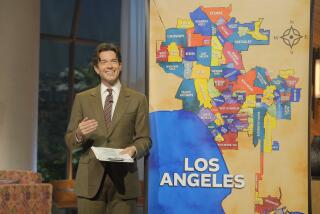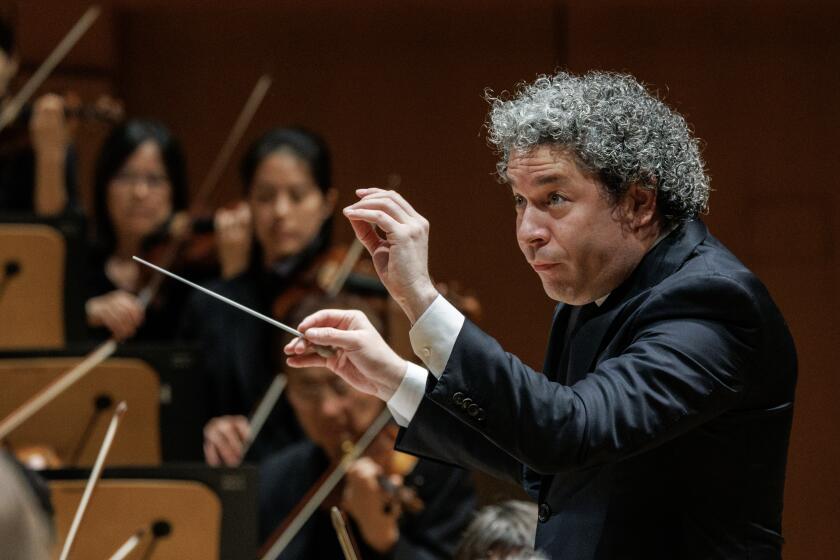OPERA REVIEW : ‘Carmelites’: A Revolution and Revelation
Poulenc’s “Dialogues des Carmelites,” which was completed in1957, isn’t the most modern of operas. But the San Diego Opera, which undertook this fine Gallic challenge on Saturday, isn’t the most adventurous of companies.
One approached the Civic Theatre with a certain amount of trepidation. Would the psychological subtleties and spiritual complexities of the piece--a fragile setting of Georges Bernanos’ drama--be conveyed with the proper concern for mood, idiom and historical perspective? Would the local audience--usually happiest when confronted with cozy stage pictures, carefree plots and extrovert tenors--respond to this bleak tragedy about the martyrdom of 16 nuns in Compiegne during the French Revolution?
Poulenc may not have been a violent avant-gardist. Still, one can’t confuse him with Puccini. There are no gut-busting climaxes in this daunting dialogue, and no hit tunes.
One needn’t have worried. The San Diego Opera took Poulenc seriously on his own lofty terms. The attentive San Diegans--unlike the sophisticated Angelenos who found Liszt’s “Faust” symphony too much of a trial only last week--seemed appropriately moved.
The only debatable elements in the “Carmelites” production involved some of the theatrical decisions. Bliss Hebert, the seasoned director, introduced a self-conscious staging scheme that required the principals to perform their urgent maneuvers on a central ramp while the generally unaroused rabble observed the proceedings from bleachers.
The motley rabble, not incidentally, milled about the curtainless stage, for no apparent purpose, before the opera began and during the intermissions. Anyone for “Les Miserables”?
To facilitate rapid scene changes, costumed stage hands constantly moved props around the playing area. To define locales, prosaic illustrations were flashed on a screen that served as mini-cyclorama. Here, once again, we were subjected to the handicraft of Gunther Schneider-Siemssen. His picture-postcard designs were shared this time with Houston.
John Dexter’s celebrated production at the Metropolitan Opera in 1977 demonstrated the superior power of grim abstraction. Nevertheless, the storybook version favored here did score Poulenc’s basic points in an undeniably neat and functional fashion.
Musically, the opera was in appreciative hands. Proving that there indeed is life beyond bel-canto accompaniment, Richard Bonynge maintained fluidity in orchestral textures, sustained cumulative tensions and supported the vocal exchanges sympathetically. His abiding finesse compensated for dynamic definitions that occasionally got blurred.
The cast had been carefully selected and beautifully balanced. Nova Thomas conveyed the innocent pathos of Sister Blanche with tireless, radiant tone and expressive restraint. As the girlish Constance, Cheryl Parrish mustered the complementary virtues of uncloying sweetness and lyric purity.
In what must be the most subdued assignment of an often flamboyant career, Carol Neblett brought dignity and spinto intensity to the noble utterances of Mme. Lidoine. Heather Begg as the deceptively stern Mother Marie enjoyed the advantage of brooding fervor, even when the rising line strained her open-throated mezzo-soprano.
Most memorable of all, perhaps, was Maureen Forrester as old Mme. de Croissy. Although her once-lush contralto now resembles a thing of threads and patches, she focused the resources at her command with uncanny purpose. She turned the Prioress’ death scene--which lesser artists often use as an excuse for Grand Guignol indulgence--into a riveting study of doubt that becomes terror in the process of self-revelation. She made every word tell, every inflection ring.
The supporting players, all competent, tended toward the pallid. A mellifluous young tenor from Texas named Kip Wilborn attracted attention, however, as Blanche’s brother, the Chevalier de la Force.
Virtually everyone in the non-French cast articulated the French text clearly but inelegantly. Under the circumstances, it might have been wiser to perform this essentially philosophical opera in English. If nothing else, that radical move would have allowed the public to pay more attention to the actors, and to the music.
On this occasion, the conscientious supertitle-addicts had to devote most of their energies to reading the opera. Yet another crisis of faith . . .
More to Read
The biggest entertainment stories
Get our big stories about Hollywood, film, television, music, arts, culture and more right in your inbox as soon as they publish.
You may occasionally receive promotional content from the Los Angeles Times.






